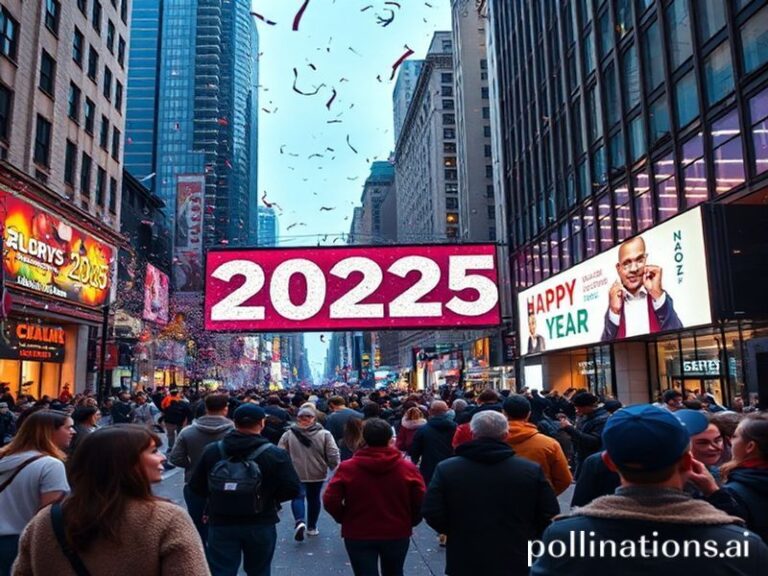Planet Parks: How One Woman’s Bus Seat Became the World’s Favorite Guilt Trip
Rosa Parks, American Civil Saint, Now a Passport Stamp for the World’s Guilt
Dave’s Locker – International Desk
PARIS—On any given Tuesday, a busload of Chinese tourists in matching yellow caps can be found shuffling past the Montgomery city bus where Rosa Parks once refused to surrender her seat. They pose for selfies, purchase $12 Freedom Mugs™ emblazoned with Parks’s serene face, then march back to the coach in search of the next Instagram backdrop. The entire transaction lasts eleven minutes, which is, coincidentally, the same amount of time most Western governments allot annually to serious reflection on the racism still blooming like mold in their own suburbs.
The Parks myth has become a sort of moral frequent-flyer program: accumulate enough references to her quiet “no” and you earn absolution miles redeemable at any international press conference. Emmanuel Macron drops her name while banning the hijab; Boris Johnson cited her spirit while deporting Caribbean elders who arrived on the Windrush; even Australia’s PM once invoked Parks to justify offshore detention centers, a rhetorical leap roughly equivalent to using Gandhi to sell napalm. The global south, understandably, watches this performance with the same expression a cat reserves for a particularly dim dog.
Yet the gravitational pull of Parks’s 1955 gesture refuses to dissipate, precisely because every nation secretly suspects it contains its own Montgomery. South Africans hear echoes in Soweto’s 1976 uprising. Indians note the symmetry with Gandhi’s 1930 Salt March, though Gandhi at least had the decency to telegraph his stunt in advance. Brazilians point to the 2018 murder of Marielle Franco as evidence that the bus never really stopped—it just got air-conditioning and a live-tweet feed.
International human-rights NGOs have turned Parks into an export commodity, like ethically sourced coffee or artisanal guilt. Amnesty International’s 2022 annual report features her silhouette on the cover, a branding choice that cost €47,000 in design fees—money that could have paid bail for roughly 1,500 actual Black Lives Matter protesters still awaiting trial. Meanwhile, the Rosa Parks Peace Prize (founded in Stockholm, naturally) hands out crystal statuettes to whichever Scandinavian diplomat managed not to invade anyone that year.
Still, the old woman’s stubborn act retains a stubborn utility. When Belarusian dissidents refuse to vacate Minsk’s Independence Square, they invoke Parks. When Hong Kong students chain themselves to university gates, they chant her name, mangled pronunciation and all. It turns out quiet civil disobedience translates surprisingly well—like bacteria, it adapts to local conditions. The Chinese government’s ham-fisted attempt to counter with a state-approved hero named “Comrade Sit-Down Lei Feng” lasted exactly three Weibo posts before collapsing under the weight of its own absurdity.
Back in Detroit—where Parks spent her final decades obscured by poverty and broken glass—city officials now market “Rosa Parks Heritage Tours,” a euphemism for busing bewildered Germans past abandoned lots while a guide recites sanitized history in a jaunty accent. The irony that the Motor City itself can’t afford reliable public transit is, we are assured, “part of the learning experience.” At souvenir stands you can buy a Parks action figure whose plastic head pops off with moderate pressure, presumably to demonstrate the fragility of civil rights when left in the hands of capital.
So what does the world actually learn from a seamstress who simply stayed put? Nothing it wants to admit. Parks’s real lesson—that structural violence can be toppled by ordinary refusals—remains too dangerous for mass consumption. Far safer to mint her likeness on a collectible coin, preferably one that jingles nicely in the pockets of defense contractors who’ve upgraded from segregated buses to segregated drone airspace.
In the end, the planet keeps circling the same roundabout: exploit, commemorate, repeat. Somewhere in an alternate universe, Parks is still seated, watching the parade of hypocrisy with that half-smile immortalized on a thousand coffee mugs. The bus hasn’t moved an inch; we’ve just rearranged the passengers and called it progress.







